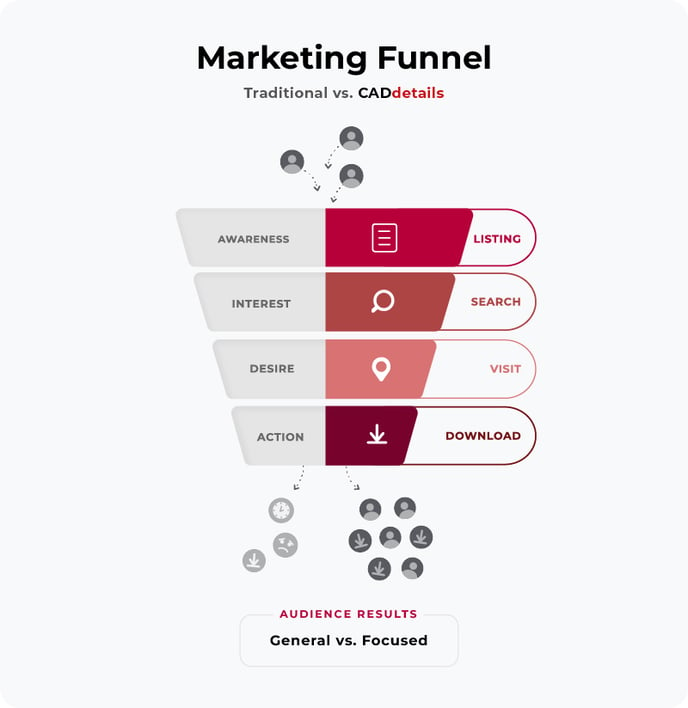Construction is an industry like no other. It is one of the largest industries in the world but differs from others in many ways such as its vastness and variability, the nature of the procurement, the professionals involved, their roles and responsibilities, and risks and hazards. Since construction industry processes differ from other industries, many of the ways we work in construction also differ. Marketing within the construction industry also has its own dynamic and considerations. A building product manufacturer needs to appeal to owners, designers and contractors. Traditional marketing approaches are inefficient and ineffective in the construction industry.
This article will contrast traditional marketing with CADdetails empowered marketing, which positions building products in front of designers actively seeking products for their projects.
The Traditional Marketing Funnel
A traditional marketing funnel maps the stages of a customer’s relationship with a business during a purchase. The process of moving through the stages is linear. The first stage is awareness when a customer is aware of a problem and potential solutions. The second stage is interest, which is a customer showing interest in a product or service. The third stage is desire when a customer reviews a brand or product, and the fourth stage is action when a customer decides to buy.

A funnel is used to visualize this process to represent the decrease in the number of prospective customers that proceed from one stage to the next. The success of traditional marketing relies on attracting a large number of people to enter the funnel, so more people can proceed through the funnel to take action and become customers. The marketing funnel concept is handy for discussing prospect conversion, but this traditional funnel does not translate well to digital marketing and certainly does not fit the process of being specified by an architect.
Digital Marketing
The traditional marketing funnel and traditional marketing approaches are failing in our information-driven world. Digital marketing requires a multi-faceted approach as opposed to the traditional linear funnel. A good digital marketing strategy attracts individuals, focuses on engagement, and provides data-backed insights on consumer behavior. Digital marketing cannot be accurately represented by the simplistic funnel because the purchase process is no longer linear. The consumer may enter the funnel at any point. They may become engaged with your brand while comparing competitive options, researching solutions, requiring assistance, or deciding which solution fits their needs. Purchase paths are now all over the place and are driven by the desires of the prospect. Prospects want to make informed purchase decisions, so providing product information in the right places, and in the right format is key for brands. Recognizing when prospects' online behavior signals their intent to buy can give an advantage. Providing touch points with a range of relevant information to satisfy a range of needs is key to converting the modern purchaser into a loyal customer.
Modern funnels must address retention, customer satisfaction, loyalty, and advocacy. After-sales service reinforces the relationship with customers, and can lead to advocacy for your products. Modern strategies realize customers are researching purchases online before buying, and this is true in construction too. In the B2C consumer realm, this can take the form of leaving positive reviews, while in the construction industry advocacy could be advising other professionals about your product, or incorporating your products or system into a designer’s office master specifications for use by the firm on multiple projects.
Marketing Challenges for Building Product Manufacturers
As a building product manufacturer, your challenge is getting your brand message across to architects, designers, engineers, contractors, and specifiers. You need to consider where and when design professionals discover your brand. When are designers exploring products out of curiosity, and when are they selecting products for a project? Where are designers learning about products, and what opportunities are there for you to get your product information in the hands of actively specifying professionals? How can you make your products easier to access? Where can you bridge the divide between your products and construction projects?
CADdetails Enhanced Marketing for Building Product Manufacturers
CADdetails offers a multifaceted approach for building product manufacturers that need to have their products specified. As the leading provider of manufacturer-specific building product information, CADdetails delivers product information to over 660,000 architects and designers in North America.
By having a wide range of design information readily available to the AEC community, CADdetails attracts active designers in need of product information. CADdetails has been introducing designers to products for over 25 years. When designers are actively seeking products to include in their projects, CADdetails offers a range of types of files and product information for designers. Written specifications and 2D CAD drawings are essential components of project manuals, and designers appreciate the high-quality files developed by CADdetails. Firms that require BIM for all projects are able to find high-quality models on CADdetails.com, developed in-house by CADdetails’ BIM experts. These readily available files created with designers in mind allow manufacturers partnered with CADdetails to get their products included in project plans before projects open up for bidding. Designers are inspired by the high-resolution project images and information provided in the CADdetails Project Gallery, and the gallery gives manufacturers another way to showcase their products and capabilities.
In addition to developing and promoting building product manufacturer information, CADdetails provides in-depth tracking and reporting. The CADdetails Client Portal offers the most detailed tracking data in the industry and provides building product manufacturers with valuable insight into the performance of their products on CADdetails.com. The CADdetails Design Hub also gives manufacturers the chance to leverage their product information anywhere online, while gathering valuable information and metrics about the performance of their Microsite.
To learn how CADdetails empowered marketing can work to get your building products specified, book a call with one of our experts!
Cover image by Karolina Grabowska on Pexels


